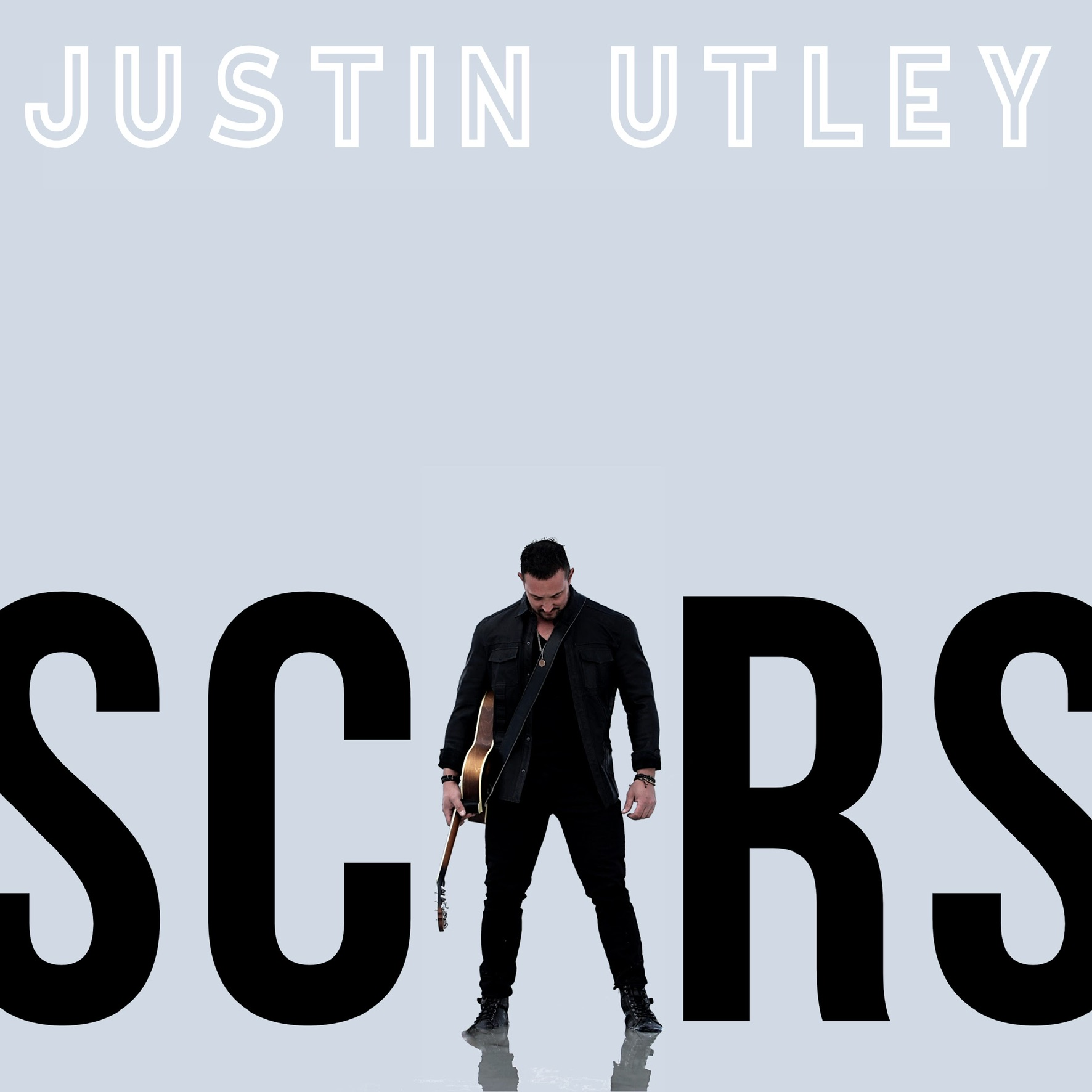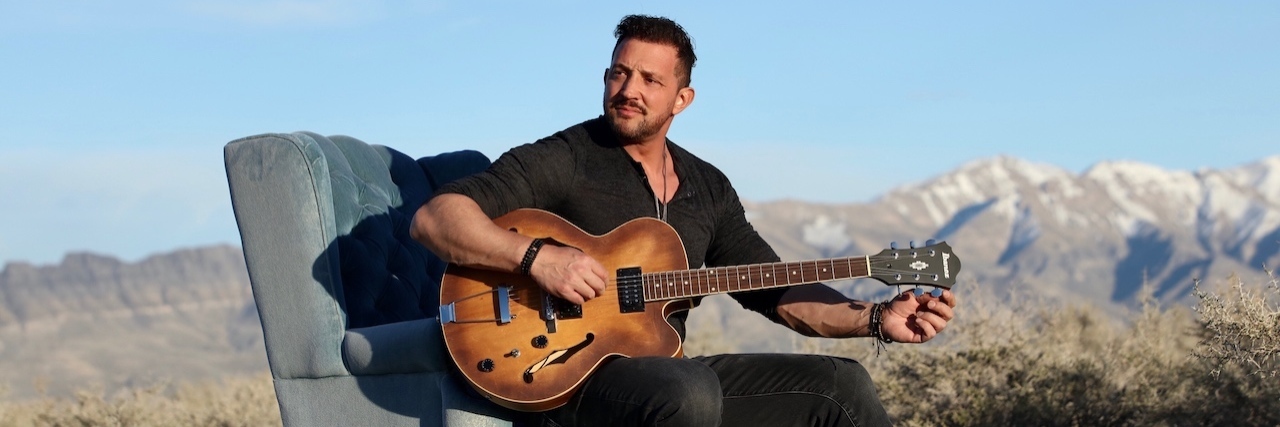How Surviving a Suicide Attempt After LGBT Conversion Therapy Inspired My New Song 'Scars'
Editor's Note
If you experience suicidal thoughts, the following post could be potentially triggering. You can contact the Crisis Text Line by texting “START” to 741741.
What would it be like to be “normal” is something I’d asked myself a lot growing up. Now, there’s the “normal” of what I perceived around me to be the gold standard. Then there’s another side to “normal” that I discovered after I had to move away from my home state of Utah.
Life growing up was much like any other kid my age at any given point in time on my block. Cub Scouts. Boy Scouts. Soccer. Swimming lessons. Piano lessons. School dances. Extracurricular activities and clubs. Then combine that with being raised in a very tight-knit Latter-Day Saint (Mormon) community. Nearly everyone on my block (or even a mile radius) went to the same church congregation. If someone was in need of help, there was a call list ready to go. There’s a lot of support there too.
There is beauty when religion and spirituality are used to help center the soul and uplift the spirit. Though, it isn’t without absolute commitment to the fold: Church every Sunday for three hours. Seminary classes during public school hours. Interviews about worthiness and purity, including no R-rated movies, no coffee or tea, with a huge emphasis on the fact that members of my church were the most chosen of all and held the only rights to the kingdom of heaven.
Absolute obedience was a huge factor as well. The leaders of my church made it imperatively clear to avoid making close friends or from dating anyone outside the membership of the faith. I remember taking a non-member young woman to a school dance my senior year of high school. She was stunning. She wore a dress that showed her shoulders. Apparently, that was a big topic of discussion. I was on the high school seminary council board. Someone had asked me if I was trying to help bring her back to church, because otherwise, why would I take someone “dressed like that” as my date to a school dance?
But things were even more “abnormal” for me. I was dealing with these “bro crushes” as far back as I could remember. I heard how people at school and at church would vilify gays and lesbians. I didn’t really identify with the stereotypes they were mocking, so this couldn’t be my issue. I figured either most guys have these feelings of admiration and attraction or no one does and I’m the only one. But in either case, no one was talking about it, so I kept it hidden.
Those crushes and feelings got stronger, and it got to the point that I told my bishop. He told me I wasn’t gay, and that what I was experiencing was called “same gender attraction,” and that therapy would help. In fact, if they found the root cause of it, it could be significantly diminished or cured altogether.
I enrolled in conversion therapy for the sake of my salvation and my standing with my church. At first it was wonderful to finally be able to talk to people who were in the same situation as I was. I didn’t feel so alone anymore. I attended weekly meetings, support groups and therapy for two years. During that time, it was decided that, since my parents and upbringing didn’t cause my problem, it must be that I had been sexually molested as a child and just didn’t remember because it was so awful. “Repressed memory” was the scapegoat the therapists used. I was given medication to deal with the PTSD and anxiety is must have caused me and to diminish my sexual desires, since it was considered a learned behavior from my childhood.
The problem is, that was a lie. I wanted so badly to conform to an ideal that I handed over my dignity, my integrity and identity. I was dating women, but nothing would last. Instead of being cured, I learned some very unhealthy coping strategies and was taking medication to numb my emotions. I came out to my family as being molested as a child and dealing with adulthood repercussions, instead of being gay. My family, although shocked by this, didn’t find it unusual. Utah is at the top of the nation’s statistics when it comes to child sex abuse: one in four girls and one in every five boys are molested before adulthood.
Finally, after two years, I started having doubts about this therapy. It just wasn’t working. Some of these men had been attending sessions for decades, many of which are still having sexual encounters at rest stops to fill that “need” of being intimate with the sex they’re attracted to. Except in those situations, there is no real intimacy. And that’s not a life I wanted to have.
I figured it was time to try something else: to pursue how I felt toward another man, in a healthy way. I began dating a trainer from the gym. He and I weren’t out, in fact we were still trying to figure out what to even call our “thing.” We were too afraid to classify what our relationship was, but it was clear our feelings for each other were growing as time passed. We were dating for around seven months or so when I got an email from his brother while I was at work, telling me that Brent had been found dead the night before. They ruled it a heart attack. But I knew differently. He was struggling with the same demons, shame and fear of rejection that I had been.
My world was shattered and what was worse, there was no one I thought I could turn to for help or to mourn with. For all anyone knew, this was my friend at the gym who’d passed away unexpectedly. I decided to revisit with my bishop to find some kind of path or guidance or solace. Instead I was rebuked. I was told that Brent was taken from me because I was not supposed to be a homosexual. I was reminded that more was expected of me as a Latter-Day Saint, especially being a holder of the Priesthood (the power of God that is only given to men in the church). I was then called to repentance and was asked specifically, in detail, about the sexual sins I committed with Brent. The bishop told me that I wouldn’t be forgiven for what I’d done until I’d had godly sorrow for it. Not sorrow because Brent had died, but deeper sorrow that I had attempted a relationship that was next to murder in the eyes of the church. I had to be sorry I met Brent, and I was also responsible for the sins he committed because I knew better.
Life became extremely dark. The walls closed in. I felt more isolated than ever. I felt like I wasn’t ever going to be enough. For anyone. Nor would I be worth loving, since I felt so broken. The idea of ending the pain and not existing anymore became more and more real for me. Plus, as far as my church was concerned, you become perfected in the afterlife. So that was the only way this was going to stop. Pain and all. The internal pain became so great that I planned out the end. Just needed to decide on when.
It took the very quick realization of a friend over text to save me. He was one of the very, very few people that knew what had happened. He called the police, and they visited my parent’s house where I didn’t actually live. I got a phone call from my mother who was frantic and worried. I had to agree to meet the police to make sure I was OK and wasn’t going to harm myself. It was even more shameful and embarrassing since now I had to explain myself to a bunch of strangers. When I pulled up to the location that I had agreed to meet them at, there was a lot of commotion on the street. It was in the evening. There were flares, an ambulance, EMT and firetrucks. I thought, ‘How much more embarrassing could this be?’ I didn’t want attention. I wanted to disappear.
Soon, I was put into a police car, and the officer walked away toward the firetrucks. I was locked inside. I then saw, through the windshield, an SUV being pulled off of a small car. The EMTs were pulling my mother out the side window. She had followed the police to make sure I was OK and had gotten into an accident.
I waited in the ER for hours. When she finally came out, she had bruises all over. Bandages. Crutches. She sat next to me and held my hand and said “if this is what it takes for you to know you are loved, I’ll do it again.”
That night changed everything. I realized I needed to live authentically, be transparent about my mental health and be held accountable to it. I started seeing a therapist who was unbiased and evidence-based, who helped put me on a path to healing and experiencing life as it was meant to be: honestly, with all its scars, whether they’re hidden beneath the surface or not.

Since my attempt, it’s been an eye-opening experience to learn that I’m not the only one in my immediate family to attempt suicide and members of my extended family have died by suicide. Suicide is now the leading cause of death in Utah for kids, teens and young adults.
My aunt was one of the more recent casualties, and I used her high school graduation photo in the music video to “Scars,” which is the title track to my new album. I chose Sept. 10, World Suicide Awareness Day, to release the song. It’s significant for me because it brings the discussion of mental health to the table for those who haven’t had an opportunity to learn about it and a deeper conversation to those who have been impacted by losing someone to suicide. It stands as a reminder that we cannot lose the struggle to stigma and excuses.
To those considering suicide, I know that the darkness looks real because it is. But it’s also not permanent. It may be hard to see now, but the darker and longer the shadow, the brighter the light is that casts it. There is always help available to get you out of that space where there appears to be no way out of. Once you’ve found that safe space, reach out to someone else who might be struggling to find it. Empathy is more powerful than sympathy alone, and that outreach can be life-changing.
You can pre-order the full album “Scars” here and watch the music video below:
Header image via Ryan Bakerink

